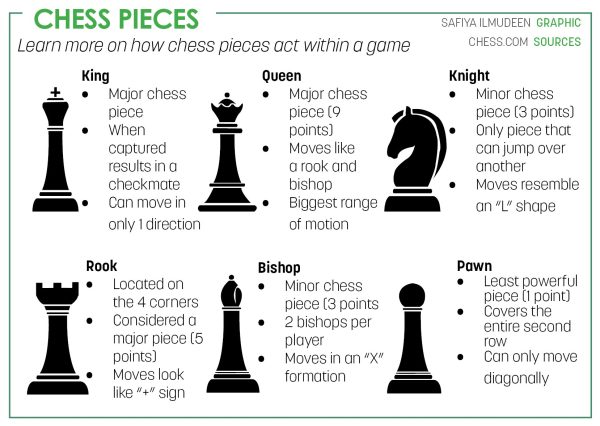While chess does not require running around a field, rink or court and is largely played while sitting, it is still very much a sport. According to the Cambridge dictionary, a “sport” is “a game, competition, or activity needing physical effort and skill that is played or done according to rules.” Chess meets all of these requirements in strides, even though the physical toll and effort is not as obvious as in other sports, such as American football and wrestling.
Competitive chess requires a large amount of physical effort and exertion. This is most evident in tournaments, where the stress and mental exertion of chess ultimately has physical side-effects, with grandmaster Rustam Kasimdhzanov losing 17 pounds in a six-game world cup championship. This example is not uncommon, as #2 ranked chess player Fabio Caruana said he commonly loses close to 15 pounds during tournaments. In addition, Stanford researcher Robert Sapolsky hypothesized a chess player could lose over 6,000 calories a day, which is three times an average person’s daily calorie intake. Chess players also practice physically before tournaments, much like athletes in other sports. So while on the surface chess may appear to be two people only moving small pieces across a checkerboard, there is a large physical and mental effort being put out by both sides.

Chess, much like other sports, has definitive rules and a scoring system. Each game of chess leaves with either a winner and a loser, or a draw. While official scoring in tournaments is only used after the game, where a winner gains one point, a draw leads to the players receiving half a point and the loser not gaining any points, there are still ways to score within the game. Chess.com uses a point system to tell the players how they are doing in a game, where each piece is assigned a certain amount of points. A pawn, for example, is worth one point while a bishop and a knight are worth three points while a queen is worth nine. The International Chess Federation (FIDE) has specific rules on how tournaments are conducted and regulates legal and illegal moves as well as scoring participants based on their results. The competition aspect of chess is also evident within tournaments, with constantly changing world rankings, which often propels the best chess player to international fame, with Bobby Fischer being as well-known in the average American mind as other great athletes like Babe Ruth and Kareem Abdul-Jabbar.
Overall, through the competitive and organized nature of chess, as well as through the physical exertion of players, the International Olympic Committee is completely justified in considering chess as a sport and chess should be celebrated as a sport similar to those viewed as more “conventional.”
The views in this column do not necessarily reflect the views of the HiLite staff. Reach Ryan Sharp at rsharp@hilite.org.
















































































![Review: “The Immortal Soul Salvage Yard:” A criminally underrated poetry collection [MUSE]](https://hilite.org/wp-content/uploads/2025/03/71cju6TvqmL._AC_UF10001000_QL80_.jpg)
![Review: "Dog Man" is Unapologetically Chaotic [MUSE]](https://hilite.org/wp-content/uploads/2025/03/dogman-1200x700.jpg)
![Review: "Ne Zha 2": The WeChat family reunion I didn’t know I needed [MUSE]](https://hilite.org/wp-content/uploads/2025/03/unnamed-4.png)
![Review in Print: Maripaz Villar brings a delightfully unique style to the world of WEBTOON [MUSE]](https://hilite.org/wp-content/uploads/2023/12/maripazcover-1200x960.jpg)
![Review: “The Sword of Kaigen” is a masterpiece [MUSE]](https://hilite.org/wp-content/uploads/2023/11/Screenshot-2023-11-26-201051.png)
![Review: Gateron Oil Kings, great linear switches, okay price [MUSE]](https://hilite.org/wp-content/uploads/2023/11/Screenshot-2023-11-26-200553.png)
![Review: “A Haunting in Venice” is a significant improvement from other Agatha Christie adaptations [MUSE]](https://hilite.org/wp-content/uploads/2023/11/e7ee2938a6d422669771bce6d8088521.jpg)
![Review: A Thanksgiving story from elementary school, still just as interesting [MUSE]](https://hilite.org/wp-content/uploads/2023/11/Screenshot-2023-11-26-195514-987x1200.png)
![Review: "When I Fly Towards You", cute, uplifting youth drama [MUSE]](https://hilite.org/wp-content/uploads/2023/09/When-I-Fly-Towards-You-Chinese-drama.png)
![Postcards from Muse: Hawaii Travel Diary [MUSE]](https://hilite.org/wp-content/uploads/2023/09/My-project-1-1200x1200.jpg)
![Review: "Ladybug & Cat Noir: The Movie," departure from original show [MUSE]](https://hilite.org/wp-content/uploads/2023/09/Ladybug__Cat_Noir_-_The_Movie_poster.jpg)
![Review in Print: "Hidden Love" is the cute, uplifting drama everyone needs [MUSE]](https://hilite.org/wp-content/uploads/2023/09/hiddenlovecover-e1693597208225-1030x1200.png)
![Review in Print: "Heartstopper" is the heartwarming queer romance we all need [MUSE]](https://hilite.org/wp-content/uploads/2023/08/museheartstoppercover-1200x654.png)




